Table of Contents
CONDO HEATING SYSTEMS
LOW RISE APARTMENTS & HIGH RISE RESIDENTIAL BUILDINGS
Home Trade Standards is an In-Suite Heating, Air Conditioning & Ventilation Service Provider for all major Condo Heating Systems in Toronto & GTA. Our specialists are certified to work on any heating system found in condo units in Toronto!
If you are looking for repair, replacement, or maintenance services for your condo heating unit, you have come to the right place!
Our Services Are Used by Condo Boards, Property Managers, Superintendents, Landlords & Tenants. Our HVAC Experts Provide The Following HVAC Services in High Rise & Low Rise Buildings:
- Emergency HVAC Repair
- Annual HVAC Maintenance
- HVAC Replacement & Installation
- HVAC Retrofit & Remediation Services
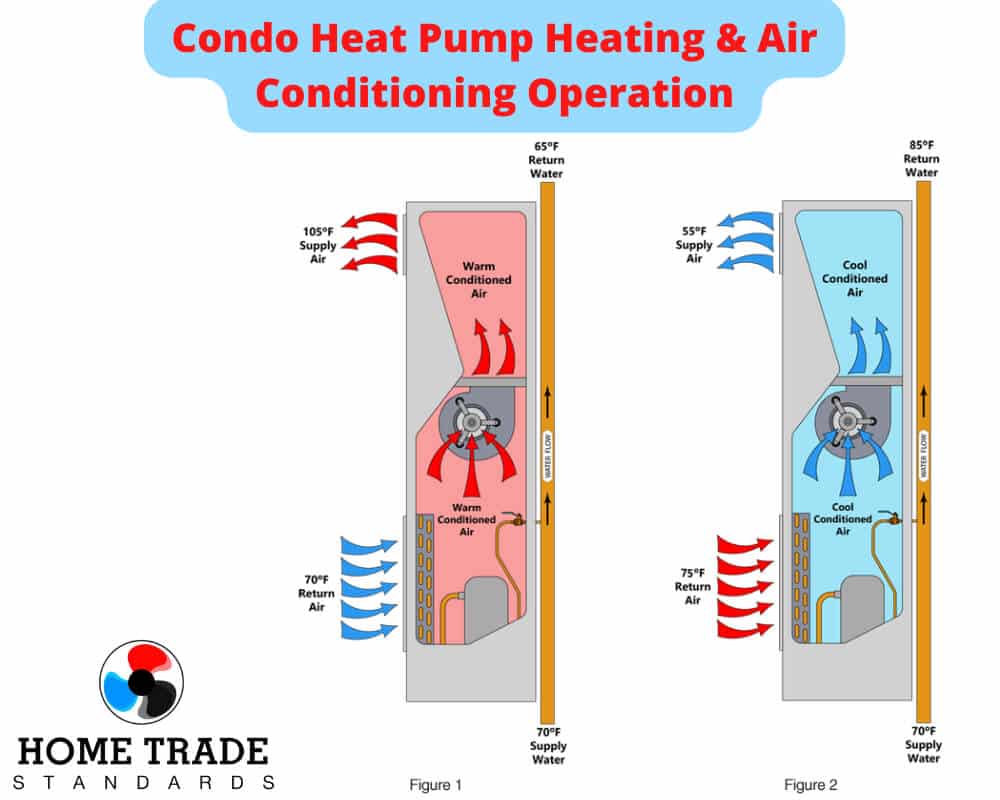
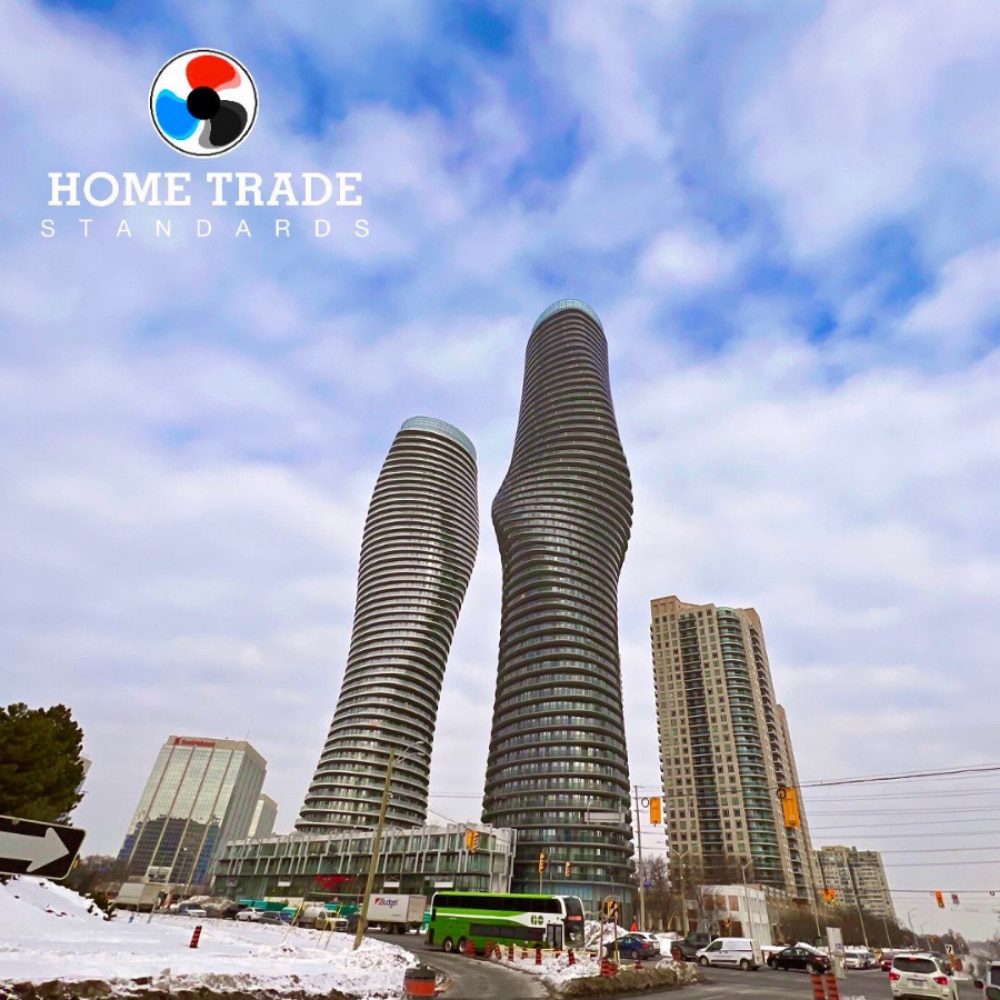
CONDO HEATING SYSTEMS
TYPES OF BUILDINGS
WHERE WE PROVIDE
HVAC SERVICES
We Are Licensed & Bonded To Service In-Suite HVAC Systems In:
- Condo Buildings
- Rental Properties
- High Rise Apartment Buildings
-
Low Rise Apartment
Buildings - Loft Suites
- Commercial Offices
- Retirement Homes
- Hotels
CONDO HEATING SYSTEMS
THE 6 MOST COMMON
HVAC SYSTEMS
1. Condo Fan Coil Unit
Fan Coil Units are the most commonly used HVAC units in both low rise and high rise apartments in Toronto & GTA. Fan Coil units can be designed in a horizontal and vertical orientation. They are centrally controlled by the building management via a boiler or chiller. This means that you can not switch from heating to cooling in some months of the year unless the Building Central HVAC system manually switches from heating to air conditioning or vice versa. Fan coil units are typically built with 2 pipes. 1. Supply 2. Return for cold or hot water depending on the season.
Some Fan Coils are designed with 4 pipes. These types of fan coil systems are able to supply heating and cooling all year round because they can bypass cold or hot at any time. Energy consumption is higher for these types of fan coil units.
2. Condo Heat Pump System
Condo Heat Pump System or Water Source Heat Pumps are designed in horizontal and vertical models. We often see vertical heat pumps in residential high-rise condominium suites. However, due to office space limitations, most commercial high-rise buildings use horizontal water source heat pumps. Heat Pump systems can switch from heating to cooling or air conditioning to heating all year round, controlled by an individual thermostat. These systems are located inside a designated cabinet or close in your condo. You can manage temperature & fan speed from the thermostat or using a manual switch on the heat pump cabinet.
3. Condo Magic Pak
Magic Pak Systems are Package HVAC Units also known as Condo Pack. These systems are stand-alone independent heating & air conditioning systems constructed in one unit. Magic Paks are designed in electric and gas models. Gas and electric Magic Pak Systems allow year-round in-suite heating and cooling capability for more comfort in residential properties. These systems are installed in condos and high-rise buildings. The most commonly used Magic Pak Systems are HWC Series gas models. Annual Magic Pak Maintenance is highly recommended to ensure there is no gas leak before using the unit in the winter season.
4. Packaged Terminal Air Conditioning or PTAC
PTAC Units, or Hotel Style Air Conditioning Systems, are also package units that provide heating and air conditioning options all year round. These systems mostly use the auxiliary electric system for heating and heat pumps for air conditioning. In addition, some PTAC units in Toronto Condominium use natural gas for heating. They are independent system from the rest of the building.
5. High-Velocity Air Handler Systems
High-Velocity Air Handler Systems consist of two components. The Condenser (Outdoor Unit) is normally located on the balcony or rooftop. The Air Handler (Indoor Unit) is located inside your suite apartment. These systems are primarily installed in newer townhouse residents in Toronto & GTA. The heating part of this unit is supplied by gas hot water heater or a boiler. The cooling part of this system is fueled by electricity and refrigeration.
6. Ductless Heat Pump Heating & Air Conditioner
Ductless Heat Pumps or Air Conditioning Mini-Split Systems Are great HVAC Systems that can be added as a secondary source of heating or air conditioning in high-rise or low-rise buildings with no pre-existing Central HVAC Units. Please note that you do need a balcony to install these systems at your condo.
CONDO HEATING & A/C SYSTEMS
The 4 Most Common Condo Heating & Air Conditioning Systems In Toronto & GTA - Home Trade Standards
CONDO HVAC SERVICES
8 COMMON HEATING & AIR CONDITIONING
PROBLEMS IN CONDOS & APARTMENTS
To get the best out of your Condo Heating & Air Conditioning System, maintain it regularly. Regular condo HVAC maintenance ensures that your heating and cooling systems last longer and work more efficiently. Some of the most common condo heating and air conditioning problems include:
- Poor Indoor Air Quality
- Condensation, Mold, & Flooding Issues
- Unusual Rattling Noises
- Lack of Proper Maintenance
- Thermostat Malfunctions
- HVAC System Not Blowing Hot or Cold Air
- Insufficient Airflow
- Not Reaching the Desired Temperature
CONDO HEATING FAQS
HEATING & AIR CONDITIONING FAQS
Who Is Responsible For HVAC Units In Condos?
Most condo residents in Toronto & GTA area are individually responsible for all in-suite emergency repair & replacement work. Property management is typically only responsible for arranging annual HVAC maintenance, such as filter changes, drain checks, and basic cleaning inside your system.
It would be best if you referred to the declaration in your condo bylaws to learn more about your condo rules & regulation. This can usually be obtained from your property management. Home Trade Standards offers Condo HVAC Repair & Maintenance Services In Toronto & GTA. You Can Contact Us For All Condo Service-Related Inquiries.
How Is My Condo Heated?
Your condo can be heated using Natural Gas, Hot Water Heating, or Electricity. Each low-rise & high-rise condominium in Toronto has a unique in-suite HVAC system. The temperature can be individually controlled using your thermostat. In-Suite HVAC systems can work independently or dependent on the central HVAC system & plumbing of the building.
How Come I Can’t Use Heating & Air Conditioning in All Seasons?
This is due to the type of in-suite HVAC system you are using in your condo. Fan Coil Systems are controlled using a central system. The property management decides when to turn on the heating or air conditioning. If you own a heat pump, magic pak, PTAC, or air handling system in a condo, you can use heating & air conditioning in all months and seasons of the year.
When Does My Condo Switch From Air Conditioning to Heating?
Closer to winter months, managements do a fan coil changeover early or mid-October after thanksgiving. Typically, the management will post a notice in the common area to notify the residents.
When Does My Condo Switch From Heating To Air Conditioning?
Most condo managers turn on fan coil air conditioning in early or mid-April or May.
Can I Hire My Own Contractor To Do HVAC Replacement or Repair In My Condo?
Although most condo building managements work with a preferred building contractor, you can hire any Condo HVAC Specialists of your choice for in-suite HVAC replacement or repair.
How Often Do I Need To Change My Filter In a Condo? Where Do I Buy a New Filter?
We recommend that our clients replace their Condo HVAC filter every 3 months before each season. Most Condos In Toronto keep extra filters at the concierge desk, and you can easily purchase a new filter from the security desk.
Why Is There a Leak From The Higher Floors?
One of the common reasons for water leaks is a clogged drain on the higher floor. All HVAC systems are equipped with a drain pan and condensation line to remove excessive water. Rusty Drain Pans, Lack of proper maintenance, and clogged drain cause drain pans to flood water onto the suites below.
I Live In a Brand New Condo. Is My HVAC System Under Warranty?
Tarion administrates Ontario home builders, to ensure they follow all regulations and new home warranty acts. According to Tarion, your In-suite Condo HVAC System is insured against repairs & mechanical failures up to 2 years after construction. In addition, you can reach out to your property management in writing if you need help with your Condo Heating & Air Conditioning.
Do I Need Approval From My Property Management or Condo Board Before I Upgrade My Condo HVAC System?
Heating & Air Conditioning Systems are not common elements in condominium apartments. If you decide to replace or retrofit the existing HVAC system in your condo, you can work with the condo HVAC company of your choice as long as they are licensed & insured.
How Long Do HVAC Systems Last In a Condo?
Depending on the system you are currently using, here is the average lifespan of common HVAC unit in a condo:
- Fan Coil Systems: 20 to 25 Years
- Condo Heat Pumps: 10 to 15 Years
- PTAC Units: 10 to 15 Years
- Condo Magic Pak or Condo Pack: 15 to 20 Years
- Air Handlers Units: 10 to 15 Years
If You’re Experiencing Heating & Air Conditioning Issues In Your Condo, Simply Call Home Trade Standards At (416 736-7001). Our Licensed Condo Heating Systems and HVAC Experts Will Be Happy To Serve Your Needs.
RESOURCES AND ARTICLES
RECENT BLOG POSTS
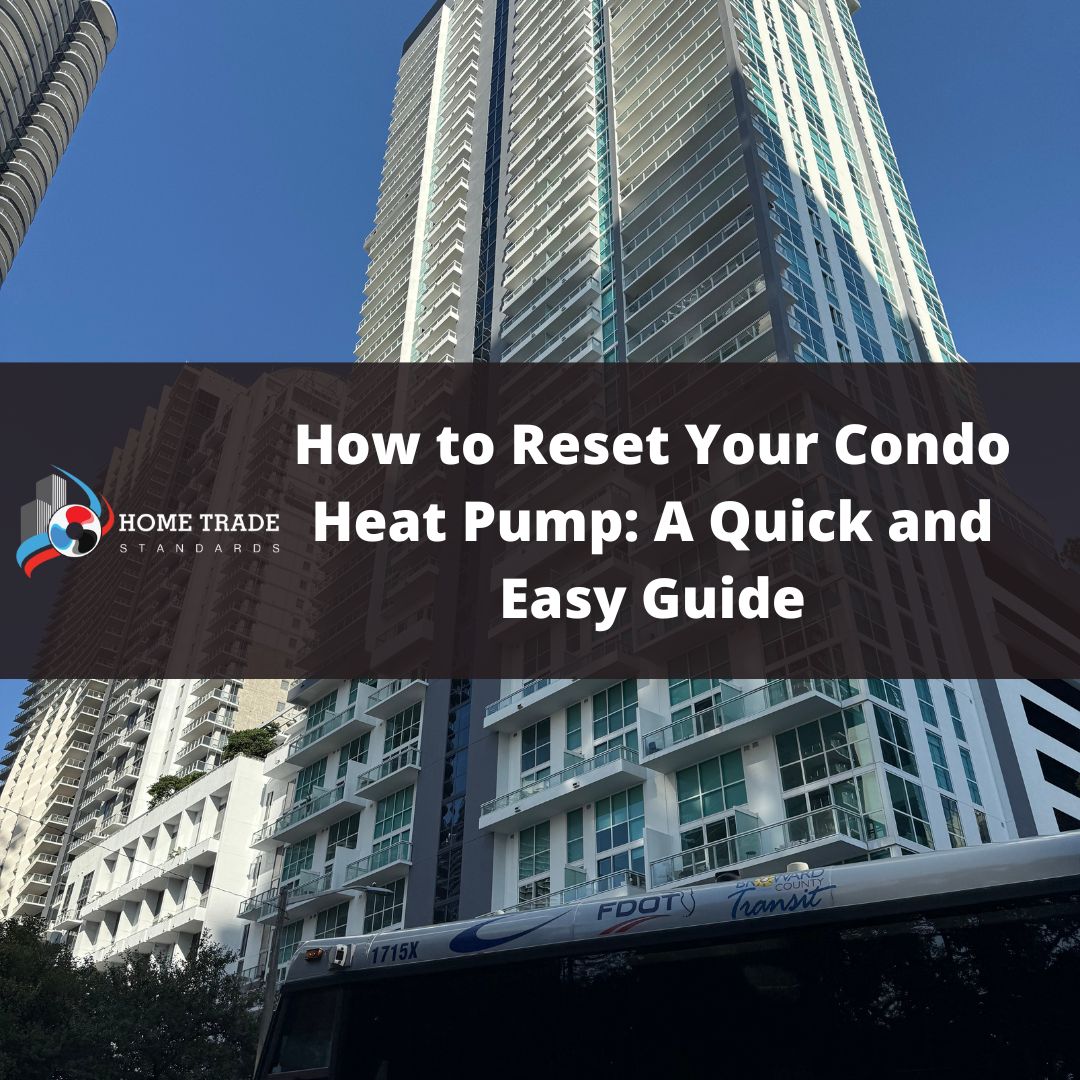
How to Reset Your Condo Heat Pump: A Quick and Easy Guide
If your heat pump is short-cycling intermittently, you may need to reset your system to return to normal operation. Here is a quick and easy
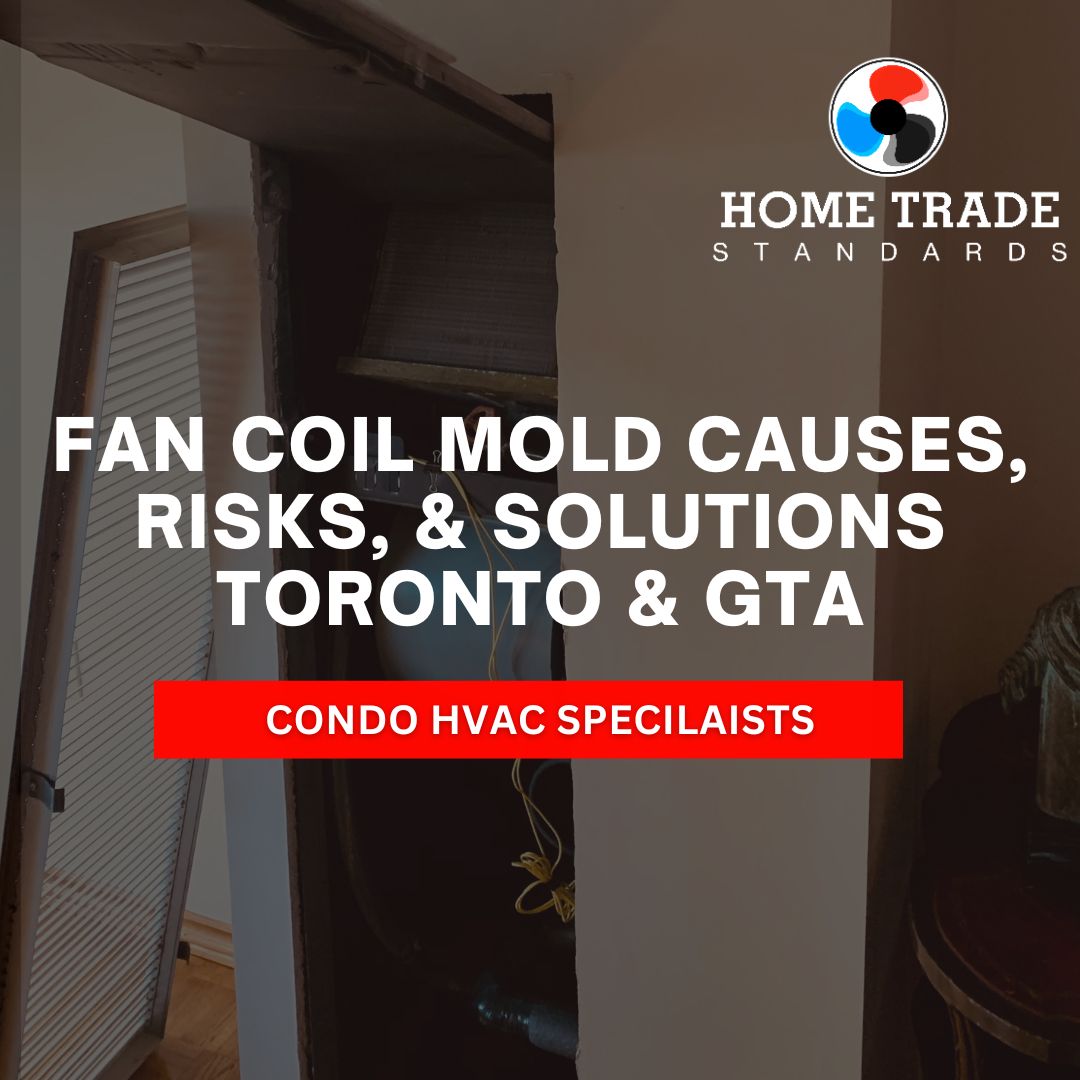
Fan Coil Mold Causes, Risks, & Solutions – Toronto & GTA
Mold in fan coil units (FCUs) is a growing concern in Toronto condos, impacting air quality, property values, and residents’ health. If mold growth is
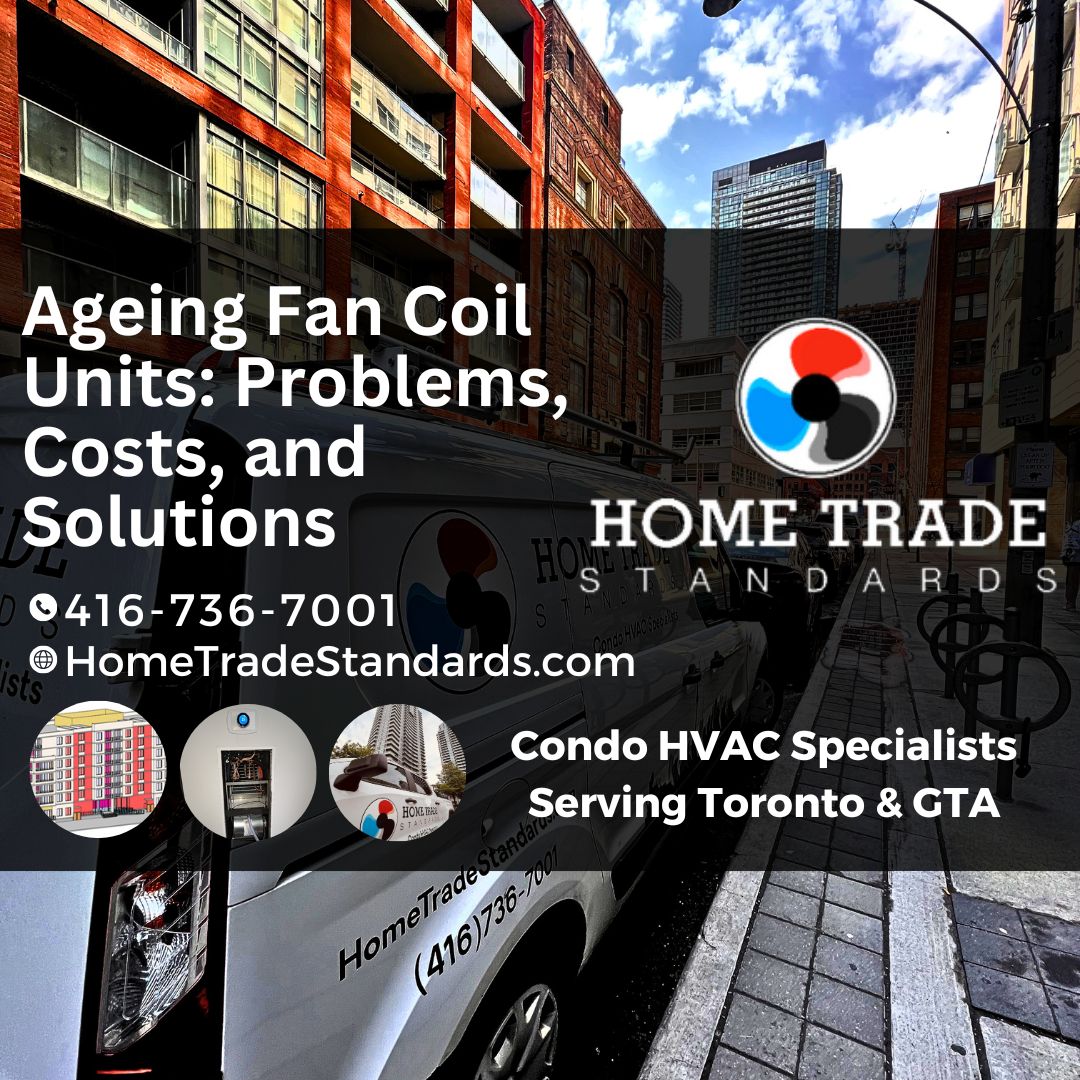
Ageing Fan Coil Units: Problems, Costs, and Solutions
Age significantly affects the performance of fan coil units, primarily due to wear and tear as well as technological obsolescence. Fan coil units that are

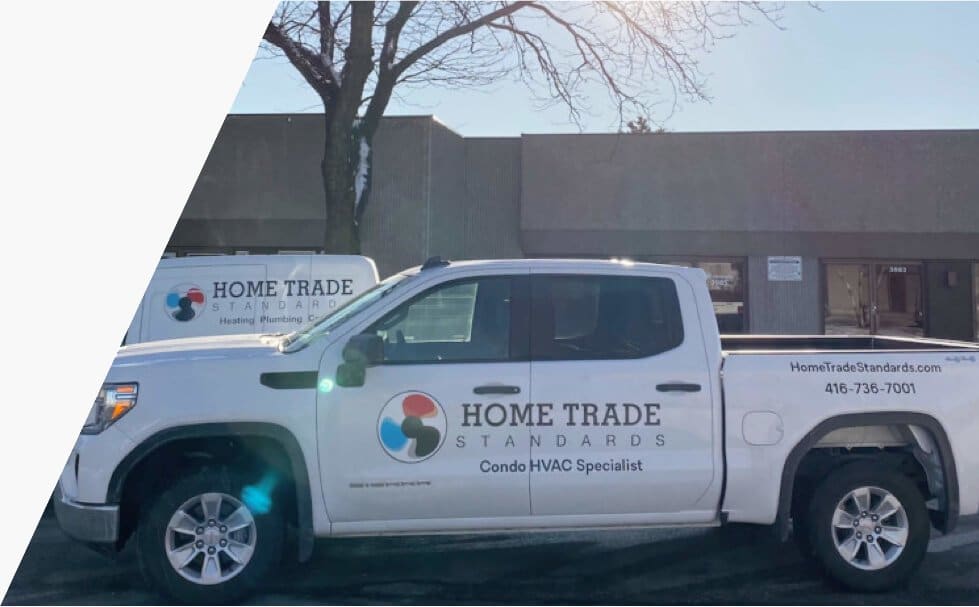
Table of Contents
CONDO HEATING SYSTEMS
LOW RISE APARTMENTS & HIGH RISE RESIDENTIAL BUILDINGS
Home Trade Standards is an In-Suite Heating, Air Conditioning & Ventilation Service Provider for all major Condo Heating Systems in Toronto & GTA. Our specialists are certified to work on any heating system found in condo units in Toronto!
If you are looking for repair, replacement, or maintenance services for your condo heating unit, you have come to the right place!
Our Services Are Used by Condo Boards, Property Managers, Superintendents, Landlords & Tenants. Our HVAC Experts Provide The Following HVAC Services in High Rise & Low Rise Buildings:
- Emergency HVAC Repair
- Annual HVAC Maintenance
- HVAC Replacement & Installation
- HVAC Retrofit & Remediation Services


CONDO HEATING SYSTEMS
TYPES OF BUILDINGS
WHERE WE PROVIDE
HVAC SERVICES
We Are Licensed & Bonded To Service In-Suite HVAC Systems In:
- Condo Buildings
- Rental Properties
- High Rise Apartment Buildings
-
Low Rise Apartment
Buildings - Loft Suites
- Commercial Offices
- Retirement Homes
- Hotels
CONDO HEATING SYSTEMS
THE 6 MOST COMMON
HVAC SYSTEMS
1. Condo Fan Coil Unit
Fan Coil Units are the most commonly used HVAC units in both low rise and high rise apartments in Toronto & GTA. Fan Coil units can be designed in a horizontal and vertical orientation. They are centrally controlled by the building management via a boiler or chiller. This means that you can not switch from heating to cooling in some months of the year unless the Building Central HVAC system manually switches from heating to air conditioning or vice versa. Fan coil units are typically built with 2 pipes. 1. Supply 2. Return for cold or hot water depending on the season.
Some Fan Coils are designed with 4 pipes. These types of fan coil systems are able to supply heating and cooling all year round because they can bypass cold or hot at any time. Energy consumption is higher for these types of fan coil units.
2. Condo Heat Pump System
Condo Heat Pump System or Water Source Heat Pumps are designed in horizontal and vertical models. We often see vertical heat pumps in residential high-rise condominium suites. However, due to office space limitations, most commercial high-rise buildings use horizontal water source heat pumps. Heat Pump systems can switch from heating to cooling or air conditioning to heating all year round, controlled by an individual thermostat. These systems are located inside a designated cabinet or close in your condo. You can manage temperature & fan speed from the thermostat or using a manual switch on the heat pump cabinet.
3. Condo Magic Pak
Magic Pak Systems are Package HVAC Units also known as Condo Pack. These systems are stand-alone independent heating & air conditioning systems constructed in one unit. Magic Paks are designed in electric and gas models. Gas and electric Magic Pak Systems allow year-round in-suite heating and cooling capability for more comfort in residential properties. These systems are installed in condos and high-rise buildings. The most commonly used Magic Pak Systems are HWC Series gas models. Annual Magic Pak Maintenance is highly recommended to ensure there is no gas leak before using the unit in the winter season.
4. Packaged Terminal Air Conditioning or PTAC
PTAC Units, or Hotel Style Air Conditioning Systems, are also package units that provide heating and air conditioning options all year round. These systems mostly use the auxiliary electric system for heating and heat pumps for air conditioning. In addition, some PTAC units in Toronto Condominium use natural gas for heating. They are independent system from the rest of the building.
5. High-Velocity Air Handler Systems
High-Velocity Air Handler Systems consist of two components. The Condenser (Outdoor Unit) is normally located on the balcony or rooftop. The Air Handler (Indoor Unit) is located inside your suite apartment. These systems are primarily installed in newer townhouse residents in Toronto & GTA. The heating part of this unit is supplied by gas hot water heater or a boiler. The cooling part of this system is fueled by electricity and refrigeration.
6. Ductless Heat Pump Heating & Air Conditioner
Ductless Heat Pumps or Air Conditioning Mini-Split Systems Are great HVAC Systems that can be added as a secondary source of heating or air conditioning in high-rise or low-rise buildings with no pre-existing Central HVAC Units. Please note that you do need a balcony to install these systems at your condo.
CONDO HEATING & A/C SYSTEMS
The 4 Most Common Condo Heating & Air Conditioning Systems In Toronto & GTA - Home Trade Standards
CONDO HVAC SERVICES
8 COMMON HEATING & AIR CONDITIONING
PROBLEMS IN CONDOS & APARTMENTS
To get the best out of your Condo Heating & Air Conditioning System, maintain it regularly. Regular condo HVAC maintenance ensures that your heating and cooling systems last longer and work more efficiently. Some of the most common condo heating and air conditioning problems include:
- Poor Indoor Air Quality
- Condensation, Mold, & Flooding Issues
- Unusual Rattling Noises
- Lack of Proper Maintenance
- Thermostat Malfunctions
- HVAC System Not Blowing Hot or Cold Air
- Insufficient Airflow
- Not Reaching the Desired Temperature
CONDO HEATING FAQS
HEATING & AIR CONDITIONING FAQS
Who Is Responsible For HVAC Units In Condos?
Most condo residents in Toronto & GTA area are individually responsible for all in-suite emergency repair & replacement work. Property management is typically only responsible for arranging annual HVAC maintenance, such as filter changes, drain checks, and basic cleaning inside your system.
It would be best if you referred to the declaration in your condo bylaws to learn more about your condo rules & regulation. This can usually be obtained from your property management. Home Trade Standards offers Condo HVAC Repair & Maintenance Services In Toronto & GTA. You Can Contact Us For All Condo Service-Related Inquiries.
How Is My Condo Heated?
Your condo can be heated using Natural Gas, Hot Water Heating, or Electricity. Each low-rise & high-rise condominium in Toronto has a unique in-suite HVAC system. The temperature can be individually controlled using your thermostat. In-Suite HVAC systems can work independently or dependent on the central HVAC system & plumbing of the building.
How Come I Can’t Use Heating & Air Conditioning in All Seasons?
This is due to the type of in-suite HVAC system you are using in your condo. Fan Coil Systems are controlled using a central system. The property management decides when to turn on the heating or air conditioning. If you own a heat pump, magic pak, PTAC, or air handling system in a condo, you can use heating & air conditioning in all months and seasons of the year.
When Does My Condo Switch From Air Conditioning to Heating?
Closer to winter months, managements do a fan coil changeover early or mid-October after thanksgiving. Typically, the management will post a notice in the common area to notify the residents.
When Does My Condo Switch From Heating To Air Conditioning?
Most condo managers turn on fan coil air conditioning in early or mid-April or May.
Can I Hire My Own Contractor To Do HVAC Replacement or Repair In My Condo?
Although most condo building managements work with a preferred building contractor, you can hire any Condo HVAC Specialists of your choice for in-suite HVAC replacement or repair.
How Often Do I Need To Change My Filter In a Condo? Where Do I Buy a New Filter?
We recommend that our clients replace their Condo HVAC filter every 3 months before each season. Most Condos In Toronto keep extra filters at the concierge desk, and you can easily purchase a new filter from the security desk.
Why Is There a Leak From The Higher Floors?
One of the common reasons for water leaks is a clogged drain on the higher floor. All HVAC systems are equipped with a drain pan and condensation line to remove excessive water. Rusty Drain Pans, Lack of proper maintenance, and clogged drain cause drain pans to flood water onto the suites below.
I Live In a Brand New Condo. Is My HVAC System Under Warranty?
Tarion administrates Ontario home builders, to ensure they follow all regulations and new home warranty acts. According to Tarion, your In-suite Condo HVAC System is insured against repairs & mechanical failures up to 2 years after construction. In addition, you can reach out to your property management in writing if you need help with your Condo Heating & Air Conditioning.
Do I Need Approval From My Property Management or Condo Board Before I Upgrade My Condo HVAC System?
Heating & Air Conditioning Systems are not common elements in condominium apartments. If you decide to replace or retrofit the existing HVAC system in your condo, you can work with the condo HVAC company of your choice as long as they are licensed & insured.
How Long Do HVAC Systems Last In a Condo?
Depending on the system you are currently using, here is the average lifespan of common HVAC unit in a condo:
- Fan Coil Systems: 20 to 25 Years
- Condo Heat Pumps: 10 to 15 Years
- PTAC Units: 10 to 15 Years
- Condo Magic Pak or Condo Pack: 15 to 20 Years
- Air Handlers Units: 10 to 15 Years
If You’re Experiencing Heating & Air Conditioning Issues In Your Condo, Simply Call Home Trade Standards At (416 736-7001). Our Licensed Condo Heating Systems and HVAC Experts Will Be Happy To Serve Your Needs.
RESOURCES AND ARTICLES
RECENT BLOG POSTS

How to Reset Your Condo Heat Pump: A Quick and Easy Guide
If your heat pump is short-cycling intermittently, you may need to reset your system to return to normal operation. Here is a quick and easy

Fan Coil Mold Causes, Risks, & Solutions – Toronto & GTA
Mold in fan coil units (FCUs) is a growing concern in Toronto condos, impacting air quality, property values, and residents’ health. If mold growth is

Ageing Fan Coil Units: Problems, Costs, and Solutions
Age significantly affects the performance of fan coil units, primarily due to wear and tear as well as technological obsolescence. Fan coil units that are











